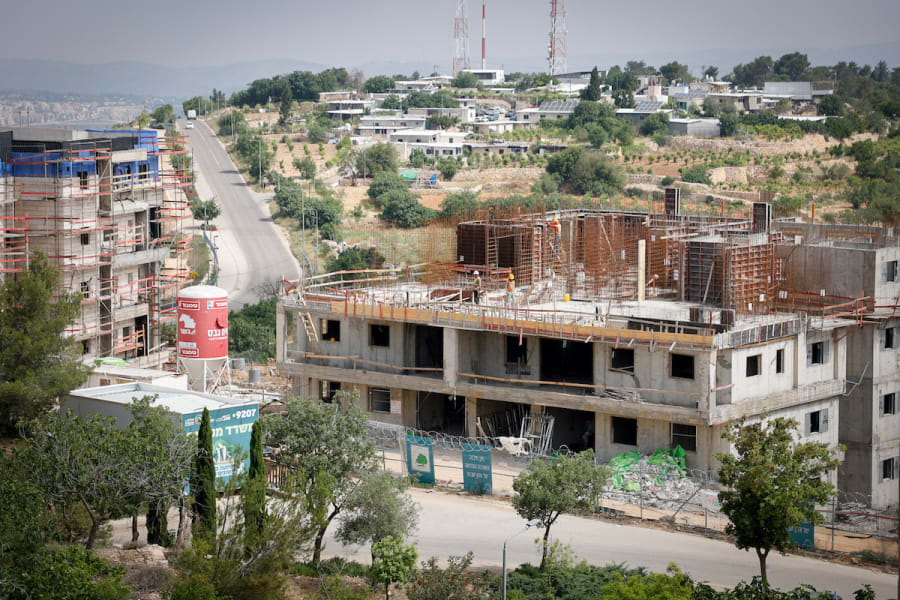Washington expresses concern over announcement that Israel will build thousands of new Jewish homes in West Bank
Far-right nationalist, ultra-Orthodox minister Smotrich is granted power to control the planned construction

The Israeli government on Sunday announced its plan to greenlight the construction of 4,560 new homes in various Jewish communities in the West Bank, also known as Judea and Samaria.
The Netanyahu-led government will press forward with its agenda, despite recent strong opposition from the U.S. Biden administration and the international community.
U.S. State Department Spokesperson Matthew Miller said the White House was "deeply troubled" by Jerusalem’s announcement.
Like most of the international community, the U.S. opposes the presence and expansion of Jewish communities in the disputed territories. Miller stressed that Washington believes such Israeli policy undermines any prospects for a viable two-state solution.
"As has been longstanding policy, the United States opposes such unilateral actions that make a two-state solution more difficult to achieve and are an obstacle to peace," warned Miller.
The Palestinian Authority in the West Bank threatened to boycott a Joint Economic Committee meeting with the Jewish state on Monday, following Jerusalem’s building plan announcement in the disputed territories.
PA Civil Affairs Minister Hussein al-Sheikh said Ramallah “will study a number of other measures and decisions for implementation related to the relationship with Israel.”
While the purpose of the Joint Economic Committee is to facilitate economic cooperation between the Jewish state and the Palestinian Authority to boost Ramallah’s collapsing economy, due to strained ties between Jerusalem and Ramallah, the meeting has not been held since 2009.
Successive Israeli governments, including former left-wing Labour-led governments, have advanced the construction of Jewish homes in Judea and Samaria, which constitute the heartland of the ancient Jewish nation. However, the current Netanyahu government stands out, with pro-settlement advocates serving as senior cabinet ministers, such as Finance Minister Bezalel Smotrich, who lives with his family outside the Jewish community of Kedumim beyond the green line.
Because the Israeli-held areas of the West Bank are under military and not civilian rule, it formally falls under the responsibility of Israel's defense minister. However, Smotrich has increasingly demanded control over civilian matters concerning the Jewish communities in the disputed territories.
The Netanyahu government passed a resolution on Sunday that grants Smotrich the power to control the planned construction of new Jewish homes in the West Bank.
Opponents of Israeli control of the territory argue that the government’s decision constitutes “de facto annexation” by placing Jewish homes beyond the green line under a civilian Israeli administration.
The left-wing Peace Now organization, which opposes Jewish homes in the West Bank, blasted the Netanyahu government’s decision to empower Smotrich.
“The government has decided to tie the fate of the residents of Israel to the messianic vision of endless settlements among millions of Palestinians whose rights are being trampled upon every morning. [Control over] planning has passed into Smotrich’s hands but the cost of construction will be borne by us all,” warned Peace Now.
By contrast, the leadership of the Jewish homes in the West Bank welcomed the government’s decision, hoping that it would signal the expansion of Jewish homes in the disputed territory.
“This government resolution brings the residents of Judea and Samaria to the regular situation of the entire State of Israel,” said Yisrael Gantz, head of the West Bank’s Binyamin Regional Council.
“This step will turn construction in the settlements into something that is not newsworthy but rather, routine,” he added.
Samaria Regional Council head Yossi Dagan expressed similar sentiments.
“We must stop treating residents of Judea and Samaria as second-class citizens. It’s unthinkable that only residents of Judea and Samaria need approval from the political echelon in order to build a home or a kindergarten,” said Dagan.
Israel gained control over the West Bank, including East Jerusalem, the Sinai Peninsula and the Golan Heights following the 1967 Six-Day War, in which Israel fought against Egypt, Syria and Jordan.
Before that, in the years between 1948 and 1967, the Hashemite Kingdom of Jordan controlled the West Bank and Egypt controlled Gaza.
Today, approximately half a million Israelis reside in Jewish communities in the disputed territory.

The All Israel News Staff is a team of journalists in Israel.













